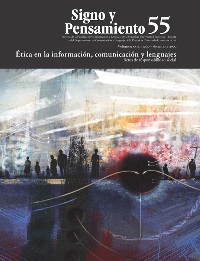Abstract
This article synthesizes the learning acquired by the author through twenty years of experience in the fascinating task of teaching ethics to university students of technology. The author begins the text by pointing out the distinction between normative and ethical ethics of responsibility; it is openly in favor of the latter but defends its conciliation with the former, since they are the ones that predominate in the world where young professionals will act. Starting from this assumption, the rest of the article tries to explain how Kant's categorical imperative, Kohlberg's model of moral development and Floridi's proposals regarding the ethics of information can be put at the service of that conciliation.
Covey, S. (1992). The Seven Habits of Highly Effective People, Londres, Simon & Schuster.
Figueiredo, A. D., & Cunha, P. R. (2007). Action Research and Design in Information Systems: Two Faces of a Single Coin. In Ned Kock (Ed.) Information Systems Action Research: An Applied View of Emerging Concepts and Methods (pp. 61-96). Springer.
Floridi, L. (1998). “Information Ethics: On the Philosophical Foundations of Computer Ethics”, Proceedings ETHICOMP98, The Fourth International Conference on Ethical Issues in Information Technology, Erasmus University.
Floridi, L. (2003). On the Intrinsic Value of Information Objects and the Infosphere. Ethics and Information Technology, vol. 4, núm. 4, pp. 287-304.
Floridi, L. (2006). A Look into the Future Impact of ICT on Our Lives. The Information Society, vol. 23, núm. 1, pp. 59-64.
Kant, I. (1964). The Groundwork of the Metaphysic of Morals. H. Paton. Kohlberg, L. (1971). From Is to Ought: How to Commit the Naturalistic Fallacy and Get Away with It in the Study of Moral Development. Academic Press.
Kohlberg, L. (1973). “The Claim to Moral Adequacy of a Highest Stage of Moral Judgment”. Journal of Philosophy, vol. 70, pp. 630-646.
Schön, D. (1983). The Reflective Practitioner: How Professionals Think in Action. London, Temple Smith.
Shafer, W. D., Swanson, G., Bene, N. & Newberry, G. (2001). Effects of Teacher Knowledge of Rubrics on Student Achievement in Four Content Areas. Applied Measurement in Education, vol. 14, num. 2, pp.151-170.
Smith, H. J. e Hasnas, J. (1999). “Ethics and Information Systems: The Corporate Domain”, MIS Quarterly, vol. 23, num. 1, pp. 109-127.
Varela, F. (1992). Un Know-How per l’Ética. Roma-Bari, Gius, Laterza & Figli Spa.
Vygotsky, L.S. (1978). Mind and society: The development of higher psychological processes. Cambridge, MA, Harvard University Press.
PÁGINAS WEB
ACM (1992). “ACM Code of Ethics and Professional Conduct” [em linha], disponível em: http:// www.acm.org/about/code-of-ethics, recuperado: 29 de Julho de 2009.
AIS (2003). “AIS Code of Research Conduct” [em linha], disponível em: http://home.aisnet.org/ displaycommon.cfm?an=1&subarticlenbr=15, recuperado: 29 de Julho de 2009.
Center for Business Education. “Giving Voice to Values” [em linha], disponível em: http:// www.aspencbe.org/teaching/gvv/index.html, recuperado: 29 de Julho de 2009.
IEEE (2006). “Code of Ethics” [em linha], disponível em: http://www.ieee. org/portal/pages/iportals/ aboutus/ethics/code.html, recuperado: 29 de Julho de 2009.
Institute for Global Ethics. “Dilemmas” [em linha], disponível em: http://globalethics.org/dilemmas. php, recuperado: 29 de Julho de 2009.
UNESCO (2007). “Ethics and human rights in information society” [em linha], disponível em: http://portal.unesco.org/ci/en/ ev.php-url_id=24772&url_do=do_topic&url_ section=201.html, recuperado: 29 de Julho de 2009.
This journal is registered under a Creative Commons Attribution 4.0 International Public License. Thus, this work may be reproduced, distributed, and publicly shared in digital format, as long as the names of the authors and Pontificia Universidad Javeriana are acknowledged. Others are allowed to quote, adapt, transform, auto-archive, republish, and create based on this material, for any purpose (even commercial ones), provided the authorship is duly acknowledged, a link to the original work is provided, and it is specified if changes have been made. Pontificia Universidad Javeriana does not hold the rights of published works and the authors are solely responsible for the contents of their works; they keep the moral, intellectual, privacy, and publicity rights.
Approving the intervention of the work (review, copy-editing, translation, layout) and the following outreach, are granted through an use license and not through an assignment of rights. This means the journal and Pontificia Universidad Javeriana cannot be held responsible for any ethical malpractice by the authors. As a consequence of the protection granted by the use license, the journal is not required to publish recantations or modify information already published, unless the errata stems from the editorial management process. Publishing contents in this journal does not generate royalties for contributors.


